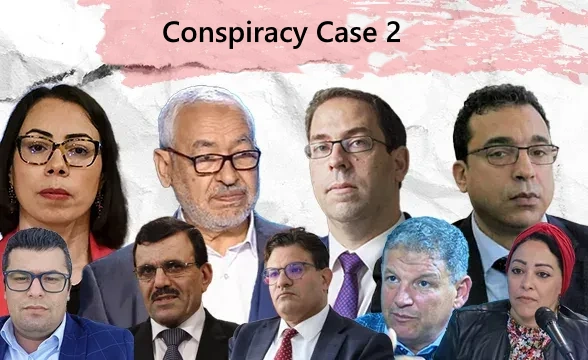The Fifth Criminal Chamber, specializing in terrorism cases at the Tunis Court of First Instance, decided to postpone the hearing of the case known as “Conspiracy Against State Security Case 2” until May 27, while rejecting all requests for bail for any of the detainees. The hearing was held remotely, despite objections from the defense team, which denounced “a violation of the principle of confrontation in person” and “political control of the proceedings.”
The case includes 21 defendants, including prominent political figures such as Rached Ghannouchi, Ali Laarayedh, Abdelkarim Labidi, Mahrez Zouari, Habib Ellouze, Kamel Bedoui, Rayan Hamzaoui, Nadia Akacha, Youssef Chahed, and others. They are charged with conspiracy against state security, forming a terrorist group, financing terrorism, and attempting to overthrow the government. The charges were based on a single, contradictory testimony from an unidentified individual (Witness X), without any physical evidence or seized items to support the allegations.
Legal Background of the Case:
According to judicial documents and the decision to close the investigation, the case is based on an analysis of ordinary communications between individuals of different political persuasions, and on allegations that were not substantiated by tangible evidence. The prosecution did not present any evidence to support the hypothesis of the existence of an armed organization or coup intentions, nor were any weapons seized or actual operational plans presented.
An analysis of the case file reveals that:
- The testimony of the secret witness is the primary source of the accusations, and he later retracted a large portion of his statements.
- The prosecution relied on interpretive analyses of phone calls without direct evidence.
- The investigations ignored the absence of seized items and relied on informant reports.
- The case was marred by violations, such as the establishment of a summer-time legal unit out of jurisdiction, the disregard of defense demands, and the refusal to hear defense witnesses.
Article 13 of the Anti-Terrorism Law requires the presence of physical acts of violence or intimidation, which was not the case. Article 72 of the Penal Code requires the presence of a physical act to overthrow the regime, which was not proven by the facts or evidence in this case.
Position of the Freedom for Tunisia Observatory:
The Freedom for Tunisia Observatory expresses its deep concern about the course taken in the “Conspiracy 2” case, and emphasizes that:
- Resorting to remote trials and the refusal to release detainees without legal justification undermine the most basic elements of a fair trial.
- The use of a single, conflicting testimony as the sole source of accusation contradicts international standards for the integrity of judicial proceedings.
- The case exemplifies the exploitation of the judiciary in political conflicts, where legitimate political activity is conflated with terrorist crimes to discredit the opposition.
- The fact that the trial of these figures coincides with major political transformations reinforces the hypothesis of selective targeting.
The Observatory calls for:
- The immediate release of those detained in this case.
- The dropping of the charges, which are based on a flimsy and unsubstantiated basis.
- An investigation into legal and procedural violations, including the holding of remote hearings.
- Inviting the UN Special Rapporteur on the independence of the judiciary to visit Tunisia.
- Calling on international organizations to strictly monitor this and other cases of a political nature.





